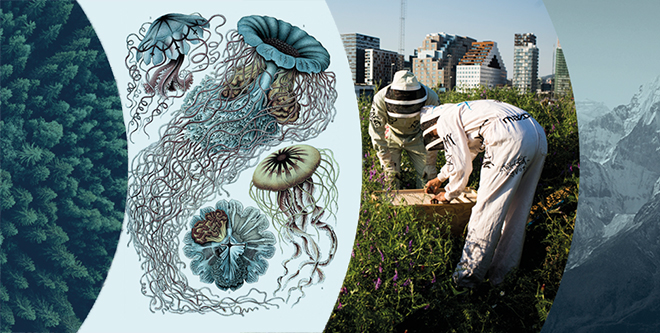Master’s students at UiO can now apply for an Honours Certificate in Environmental Humanities and Sciences. Courses will be taught in English.
“This is an offer for students who are passionate about climate change, who care about the time we live in and want to create change,” says Gro Bj?rnerud Mo, Pro-Rector at the University of Oslo.
The Honours Certificate consists of 20 credits that the students add to the 120 credits in their main degree subject. It consists of interdisciplinary teaching in the natural sciences, humanities and social sciences, combined with practical projects.
“The certificate is the first of its kind in Norway. UiO has created this study option both in response to our students’ interest in environmental issues and to meet the urgent needs of society,” Mo emphasizes.
Created for students who care about climate change
Students today live in a world where parallel crises put issues such as the climate crisis, species extinction, food supply and global pandemics at the top of the agenda.

Ursula Münster, anthropologist and director of the Oslo School of Environmental Humanities, coordinates the academic and educational content. She plans for a learning situation that addresses current problems and explores solutions for the future.
“This study option speaks directly to the concerns that many people share while living in today's precarious times,” she says.
The teaching is interdisciplinary and takes place in small groups. Students get to participate in place-based learning about environmental challenges in Oslo, they will do field work, develop their own climate and environmental projects and learn from experts.
“We will create a space where students from different disciplinary backgrounds can learn together - and from each other. Students already bring in a lot of knowledge from their backgrounds in fields as diverse as philosophy and history, mathematics and physics, or biology and earth system science.”
Münster emphasizes that this is a way of strengthening one's own academic skills.
“By learning from other disciplines, students gain insights that enable them to ask critical questions about their own field of study. This makes them smarter and better students,” she says.
Learn to communicate academic knowledge
Students will develop their own projects about the issues that they are passionate about. Whether they want to explore urban agriculture, environmental activism, green energy transition, teaching climate change, or other topics, they can do it here. They will also learn to communicate their knowledge.
“It can be difficult to communicate across disciplines, but it is extremely important to be able to explain to others why your field is relevant,” says Münster.
In the interdisciplinary lecture series “Welcome to the Anthropocene” students will be inspired to communicate their environmental knowledge by learning from some of the most prominent scholars at UiO, who present their research on the climatic and environmental crisis from different disciplinary perspectives.
The program includes climate scientist Jana Sillmann, social geographer Andrea Nightingale, historian Kristin Asdal, social anthropologist Marianne Lien, and biologist Dag Hessen.

The climate solution must be interdisciplinary
Dag Hessen looks forward to providing students with the natural science foundation they need to understand what is at stake. Hessen currently has great success with the book Verden p? vippepunktet (The World at a Turning Point), and brings the book's message into the teaching.

“Where are we today, and where are we heading in terms of both biodiversity loss and climate change? What do we know, and what are just beliefs? Such questions will be at the heart of my teaching,” he says.
The biology professor thinks that the Honours Certificate responds to the challenges of the climate crisis.
“The students will realize that the environmental crisis is a truly interdisciplinary challenge that cannot be solved by one discipline alone. The natural sciences can point out the problems and say what is required, but the solution itself necessitates contributions from a wide range of disciplines and social institutions. The major uncertainties about future climate change lies in how we will respond as a society,” says Hessen.
Networks for the future
The students who choose the Honours Certificate in Environmental Humanities and Sciences will become specialists in their main fields of study, but will also strengthen their competence with perspectives and skills from other fields. Ursula Münster believes that there is a great need for interdisciplinarity and creativity both in the labor market and in the academia of the future.
“Science is also about speculating. We need change, therefore we need to imagine another future,” she states.
A shared commitment to the climate and practical teaching in small groups will also give students new friends.
“They will support and challenge each other, to become better academics, or better activists. And the networks they create will be valuable in whatever career they pursue after completing their education.”
Apply before 15 October
The Honours Certificate has 25 places and is open to all students who started a Master's programme at UiO in the fall of 2020. Teaching starts in January 2021, and the deadline for applications is October 15.
Read more about the Certificate’s structure, admission and learning outcomes.
Facts:
-
The Honours Certificate in Environmental Humanities and Sciences consists of 20 ECTS credits and runs in parallel with a master's program at UiO
-
There are 25 places
-
The teaching is creative and interdisciplinary, and consists of lectures, projects and excursions
-
You will meet inspirational lecturers from the natural sciences, social sciences and humanities
-
You will gain competence in communicating environmental issues across disciplines
-
The option is suitable for students who want to learn about the climate, and strengthen their academic and creative skills
Questions about the certificate?
